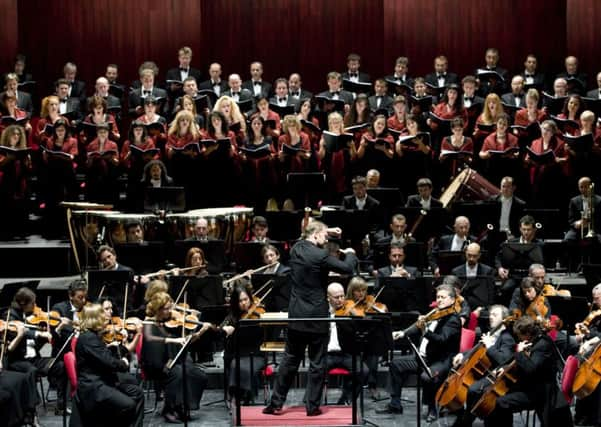Sarah Urwin Jones: It's been a vintage year for the classical genre


They were certainly put to good use in this fabulous Bergen Philharmonic concert under conductor Edward Gardner, who previously directed Skelton as Grimes at English National Opera.
These were superb all-round forces, from orchestra to soloists to the massed choirs of the Bergen Philharmonic along with students from the Royal Northern College of Music as the Borough mob that hounds Skelton’s vulnerable fisherman into the sea. Erin Wall made a compassionate Ellen Orford, the brutal Grimes’ tenuous link to hope, and Christopher Purves was a wonderful dramatic linchpin as Captain Balstrode. Skelton and the rugged choral mob dominated in the end, as the choir intoned “Peter Grimes!” and the man himself, his ethereal, disturbed elegies a distant memory, walked out to a lonely death at “sea” amongst the stalls.
Advertisement
Hide AdAdvertisement
Hide AdAt the following morning’s Queen’s Hall concert by Andreas Haefliger, hearing Berg’s Piano Sonata Op 1 confirmed my opinion of the pianist as a dreamer, lingering on the ethereal, pushing the sustain pedal to the limits, creating an evocative sound drifting between here and eternity. Haefliger’s genius is in that gap between keyboard and mind.
The birds of Liszt’s St Francois D’Assise twittered dazzlingly under Haefliger’s fingers as his sermonising St. Francois reached out to them, intoned against the brilliance of Liszt’s imagination. Beethoven’s Piano Sonata in A Major followed, Haefliger introspective in the first movement, the Adagio like a suppressed memory, Beethoven’s innovations appearing fresh in the pianist’s workings.
Musorgky’s Pictures At An Exhibition, now more usually associated with Ravel’s fabulous orchestration, were superb. Haefliger’s walker stumbled dreamily around the gallery, the Tuileries full of squabbling children, the Catacombs darkly sepulchral. The final Great Gate of Kiev threatened to finish off the Queen’s Hall Steinway, but Haefliger’s playing was so inspiring it sent me straight off to the music shop to hunt down the score.
That evening came one of the opera programme’s many anticipated highlights with the first in John Eliot Gardiner’s trilogy of surviving Monteverdi operas, given a semi-staging – one of the finest of that genre that I have seen – for the 450th anniversary of Monteverdi’s birth.
The staggering thing about Monteverdi is the diversity of his operatic output. L’Orfeo is a long meditation on love and death, Il Ritorno D’Ulisse in Patria is action-packed, and L’Incoronazione di Poppea an innovative take on a new form which Monteverdi had all but defined.
Gardiner’s coup is to stage the action amongst his crack period instrument orchestra, The English Baroque Soloists, parting his musical forces like the Red Sea allowing The Monteverdi Choir to pass through the centre to interact with the musicians – who, in L’Orfeo, became “Music”, their glory extolled by the wonderful Hana Blazikova as “La Musica”. She soon took on the part of the doomed Eurydice to Krystian Adam’s Orfeo. Adam, suffering from a throat infection, sang with Orfeic beauty, lulling Gianluca Buratto’s menacing boatman Caronte to sleep before the same singer, as a mighty Plutone, allowed him to pluck the snake-bitten Eurydice from the Underworld.
The following night, a truly fabulous Il Ritorno d’Ulisse in Patria brought humour into the mix, not least from the excellent Buratto as one of Penelope’s tiresome suitors, vocally and dramatically superb, in another “stage” treatment that was a revelation on all fronts.